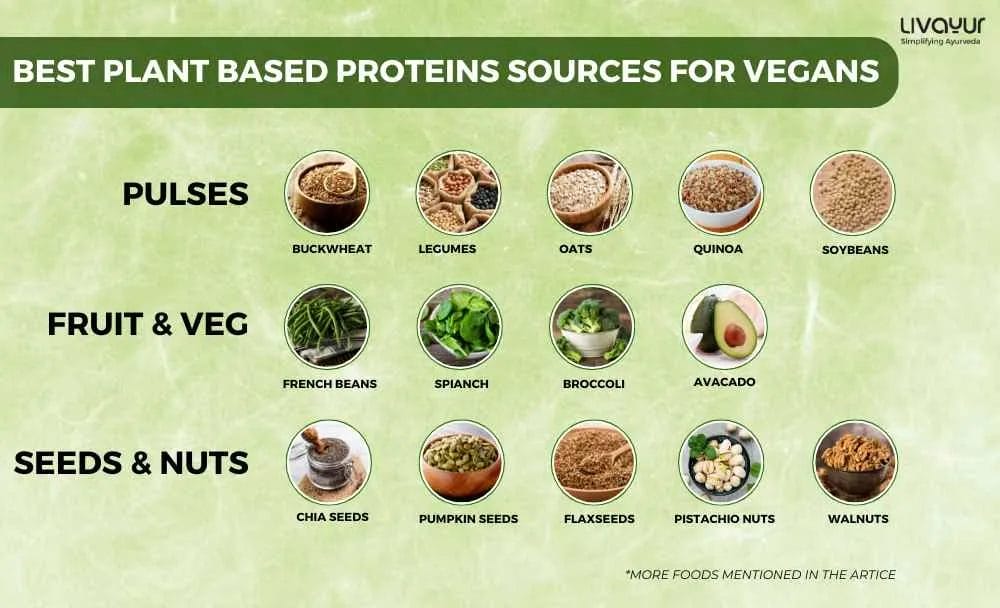This article is reviewed by experts.

रस्याः स्निग्धाः स्थिरा हृद्या आहाराः सात्त्विकप्रिया
Foods dear to those in the mode of goodness increase the duration of life, purify one’s existence and give strength, health, happiness and satisfaction
When it comes to vegan diets, finding good sources of protein is important. Luckily, there are plenty of plant-based options to choose from. Foods like legumes, oats, and quinoa are great for protein and energy. Soybeans have all the important amino acids, and chia seeds and nuts like pistachios and walnuts are full of nutrients. In this blog, we take a look at some of the best plant-based protein sources for vegans.
Importance of Protein for the Body
Most people monitor their calorie, sugar, and salt intake. But protein is an essential macronutrient that is often ignored. Protein largely helps create and maintain all of the cells in your body. Protein is necessary to maintain muscle mass, help regulate blood sugar levels, and maintain hunger. Any diet must include protein because it gives your cells the fuel they need to function and keep you energetic.
Some of the best plant-based protein sources for vegans include
1. Legumes
Legumes are a valuable source of protein for many people, including vegetarians and vegans. They offer a substantial amount of protein, as well as complex carbohydrates that provide sustained energy. This makes them an excellent choice for individuals with physically demanding lifestyles or those who rely heavily on plant-based diets.
2. Oats
Oats are a good source of protein for vegetarians and vegans. They contain 13-20% protein, and they provide all nine essential amino acids that our bodies need. This makes oats a complete protein source. Oats can be eaten in a variety of ways, including oatmeal or baked into muffins or cookies.
3. Quinoa
Not only is quinoa a great source of protein, but it also provides an incredible balance of essential amino acids. What makes quinoa stand out is its composition of all nine essential amino acids, including lysine, which is often lacking in other plant-based protein sources.
4. Aquafaba
Aquafaba is the cooking water from chickpeas. It is a great natural source of protein for vegans, as it contains 1.0 g of protein per 100 g. Aquafaba also contains significant amounts of carbohydrates and saponins.
5. Soybeans
Soy protein is considered to be a high-quality protein because it contains all nine essential amino acids that the human body needs. This makes it a good substitute for animal proteins in vegan diets.
6. Pistachio Nuts
Pistachios are a nutrient-dense source of good-quality plant protein. Like other nuts, pistachios are minimally processed, high in nutrients and low in calories. They are a good source of at least 15 different micronutrients, including fiber, potassium, magnesium, and vitamin B6. Pistachios also contain healthy fats and antioxidants.
7. Chia Seeds
Chia seeds are increasingly popular as a plant-based health food due to their many health benefits. One of their main benefits is that they are a great source of protein. Studies show that chia seeds are rich in nutrients, including fatty acids, dietary fiber, protein, all essential amino acids, vitamins, antioxidants, and minerals such as phosphorus, manganese, calcium, potassium, and sodium. Chia seeds can be considered a superfood because they are one of the highest sources of omega-3 fatty acids, which have anti-inflammatory and cardiovascular benefits.
8. Buckwheat
Buckwheat is a type of pseudocereal that is a good source of high-quality protein and other nutrients. It is also a good source of unsaturated fatty acids, fiber, vitamins, and minerals. Buckwheat is a good choice for people who are looking for a gluten-free and nutritious food.
9. Flaxseed
Flaxseeds are a good source of protein, providing about 6 grams of protein per ounce. This makes them a good option for vegetarians and vegans who are looking for plant-based sources of protein. They also contain a variety of other beneficial nutrients, including phenolic compounds, fiber, and essential amino acids.
10. Broccoli
Broccoli is a good source of protein, and its protein content can be extracted from both the stems and leaves. Studies have shown that broccoli contains more protein than soybean protein per calorie. This makes broccoli a great option for vegans.
11. French bean
They are considered the primary source of vegetable protein. A reason why common beans are considered the primary source of vegetable protein is their high protein content. Beans contain approximately 20-25% protein by weight.
12. Avocado
Avocado is a fruit that is high in healthy fats and has some protein. It can be eaten on its own, or it can be added to salads, sandwiches, and other dishes.
13. Spinach
Spinach is a leafy green vegetable that is high in protein and fiber. It can be eaten cooked or raw, and it can be added to a variety of dishes.
14. Brown and Wild Rice
Brown and wild rice are whole grains that are high in protein. They can be cooked on their own, or they can be added to soups, salads, and other dishes.
15. Pumpkin seeds
Pumpkin seeds are a good source of protein and fiber. They can be eaten roasted or raw, and they can be added to trail mix, yogurt, and other dishes.
16. Hemp Seeds
Hemp seeds are a complete protein option, which means they contain all nine essential amino acids. They can be eaten raw or cooked, and they can be added to smoothies, yogurt, and other dishes.
17. Walnuts
Walnuts are a good source of protein and healthy fats. They can be eaten on their own, or they can be added to salads, oatmeal, and other dishes.
18. Baked Beans
Baked beans are a good source of protein and fiber. They can be eaten on their own, or they can be added to salads, soups, and other dishes.
19. Tofu
Tofu is a soy product that is high in protein. It can be eaten cooked or raw, and it can be added to a variety of dishes.
20. Cashew Nuts
Cashew nuts are a good source of protein and healthy fats. They can be eaten on their own, or they can be added to desserts, salads, and other dishes.
The Table Below Shows The Protein Content Of Food per 100/g
| Protein Content | 100/g |
| Legumes | 5g |
| Oats | 17g |
| Quinoa | 14- 18g |
| Aquafaba | 0.956g |
| Soybeans | 36g |
| Pistachio Nuts | 20g |
| Chia Seeds | 5.6g |
| Buckwheat | 13.3g |
| Flaxseed | 18g |
| Broccoli | 2.8g |
| French Beans | 1.8g |
| Avocado | 1.78g |
| Spinach | 2.9g |
| Wild and Brown Rice | 4g |
| Pumpkin Seeds | 19g |
| Hemp Seeds | 33g |
| Walnuts | 15g |
| Baked Beans | 6g |
| Tofu | 8g |
| Cashew Nuts | 18.22g |
How Much Protein is Required Everyday?
Overall health of people aged 18 to 65 does not depend as much on protein, as it does on weight and general fitness objectives. People above the age of 65 need to be careful of anabolic resistance to dietary protein. The optimal amount for elders (above 65) is (0.24 g/kg/meal). It is about 70% higher than that for young adults (0.8 g/kg/day). Given the variable quality of protein consumed in the real world, it is likely that older people require more protein consumption to achieve a maximal anabolic response per meal.
Conclusion
For vegans, there are lots of tasty ways to get protein from plants. Legumes, oats, and quinoa are filling and energizing. Soybeans, chia seeds, and nuts have what our bodies need. As more people choose vegan diets, these protein-packed options are getting even more popular.
FAQs
1. What Are Some Great Plant Based Sources Of Protein For Vegans?
The best plant-based protein sources for vegans are those that are high in protein and also contain all nine essential amino acids. Some good options include legumes, soy products, nuts, seeds, and whole grains.
2. How Much Protein Do Vegans Need In Their Diet ?
A: The recommended daily intake of protein for adults is 0.8 grams per kilogram of body weight. However, vegans may need slightly more protein than this, as plant-based proteins are not as easily absorbed as animal proteins.
3. What Are The Risks of Lack of Protein in a Vegan Diet?
The risks of not getting enough protein on a vegan diet include:
Muscle loss.
Bone loss.
Weakened immune system.
Increased risk of anemia.
Weight gain.
Disclaimer: The information provided here is for general information and not meant to substitute any medical advice. Please consult your doctor for appropriate medical consultation.
References:
- https://www.ncbi.nlm.nih.gov/pmc/articles/PMC8804093/
- https://www.ncbi.nlm.nih.gov/pmc/articles/PMC8625765/#:~:text=Protein%20content%20in%20oat%20groats,associated%20with%20health%20beneficial%20properties.
- https://www.sciencedirect.com/science/article/abs/pii/S0733521016300662#:~:text=Protein%20content%20in%20the%20dry%20matter%20of%20quinoa,sorghum%2C%20and%20is%20close%20to%20wheat%20%28USDA%2C%202015%29.
- https://www.researchgate.net/publication/349478435_Aquafaba_a_new_plant-based_rheological_additive_for_food_applications#:~:text=The%20cooking%20water%20(CW)%20from,of%20egg%20whites%20%5B5%5D%20.
- https://www.sciencedirect.com/science/article/pii/S2666154321001678
- https://www.ncbi.nlm.nih.gov/pmc/articles/PMC8532077/
- https://www.ijsr.net/archive/v9i8/ART20204411.pdf
- https://www.semanticscholar.org/paper/Extraction-Technology-and-Physicochemical-of-Li-Zhu/461457b82e40e3aa0585dc066d1ecacff0d4e64e
- https://www.semanticscholar.org/paper/Avocado-Derived-Biomass-as-a-Source-of-Bioenergy-Garc%C3%ADa-Vargas-Contreras/3055909bd32c6c33f6f3245772c553464c59039c
- https://pubmed.ncbi.nlm.nih.gov/30482046/
- https://www.semanticscholar.org/paper/Protein-Recovery-from-Tofu-Whey-Wastewater-Using-a-Permatasari-Senania/a066964c5de61c56bbe0cb3e4c94c09a91140c07
- https://www.webmd.com/diet/health-benefits-spinach
- https://www.healthline.com/nutrition/wild-rice-nutrition-review#nutrition
- https://www.healthifyme.com/blog/pumpkin-seeds-benefits/
- https://www.medicalnewstoday.com/articles/323037#:~:text=Hemp%20seeds%20contain%20almost%20as,all%20nine%20essential%2
- https://health.clevelandclinic.org/health-benefits-of-walnuts
- https://www.healthline.com/nutrition/are-baked-beans-good-for-you#bottom-line


















